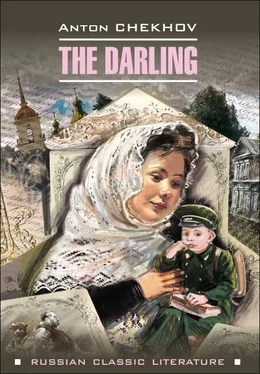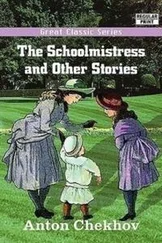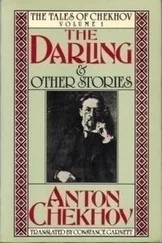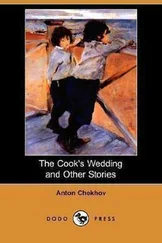Антон Чехов - The darling / Душечка. Сборник рассказов
Здесь есть возможность читать онлайн «Антон Чехов - The darling / Душечка. Сборник рассказов» — ознакомительный отрывок электронной книги совершенно бесплатно, а после прочтения отрывка купить полную версию. В некоторых случаях можно слушать аудио, скачать через торрент в формате fb2 и присутствует краткое содержание. Год выпуска: 2019, ISBN: 2019, Издательство: Литагент Каро, Жанр: Классическая проза, Русская классическая проза, Прочая научная литература, на английском языке. Описание произведения, (предисловие) а так же отзывы посетителей доступны на портале библиотеки ЛибКат.
- Название:The darling / Душечка. Сборник рассказов
- Автор:
- Издательство:Литагент Каро
- Жанр:
- Год:2019
- ISBN:978-5-9925-1149-9
- Рейтинг книги:5 / 5. Голосов: 1
-
Избранное:Добавить в избранное
- Отзывы:
-
Ваша оценка:
- 100
- 1
- 2
- 3
- 4
- 5
The darling / Душечка. Сборник рассказов: краткое содержание, описание и аннотация
Предлагаем к чтению аннотацию, описание, краткое содержание или предисловие (зависит от того, что написал сам автор книги «The darling / Душечка. Сборник рассказов»). Если вы не нашли необходимую информацию о книге — напишите в комментариях, мы постараемся отыскать её.
The darling / Душечка. Сборник рассказов — читать онлайн ознакомительный отрывок
Ниже представлен текст книги, разбитый по страницам. Система сохранения места последней прочитанной страницы, позволяет с удобством читать онлайн бесплатно книгу «The darling / Душечка. Сборник рассказов», без необходимости каждый раз заново искать на чём Вы остановились. Поставьте закладку, и сможете в любой момент перейти на страницу, на которой закончили чтение.
Интервал:
Закладка:
This thirst for personal success, and this continual concentration of the mind in one direction, makes people cold, and Ariadne was cold – to me, to nature, and to music. Meanwhile time was passing, and still there were no ambassadors on the scene. Ariadne went on living with her brother, the spiritualist: things went from bad to worse, so that she had nothing to buy hats and dresses with, and had to resort to all sorts of tricks and dodges to conceal her poverty.
As luck would have it, a certain Prince Maktuev, a wealthy man but an utterly insignificant person, had paid his addresses to her when she was living at her aunt’s in Moscow. She had refused him point-blank. But now she was fretted by the worm of repentance that she had refused him; just as a peasant pouts with repulsion at a mug of kvass 9 9 kvass – a Russian beer made from barley, malt, and rye
with cockroaches in it but yet drinks it, so she frowned disdainfully at the recollection of the prince, and yet she would say to me: “Say what you like, there is something inexplicable, fascinating in a title …”
She dreamed of a title, of a brilliant position, and at the same time she did not want to let me go. However one may dream of ambassadors one’s heart is not a stone, and one has wistful feelings for one’s youth. Ariadne tried to fall in love, made a show of being in love, and even swore that she loved me. But I am a highly strung and sensitive man; when I am loved I feel it even at a distance, without vows and assurances; at once I felt as if it were a coldness in the air, and when she talked to me of love, it seemed to me as though I were listening to the singing of a metal nightingale. Ariadne was aware herself that she was lacking in something. She was vexed and more than once I saw her cry. Another time – can you imagine it? – all of a sudden she embraced me and kissed me. It happened in the evening on the river-bank, and I saw by her eyes that she did not love me, but was embracing me from curiosity, to test herself and to see what came of it. And I felt dreadful. I took her hands and said to her in despair: “These caresses without love cause me suffering!”
“What a queer fellow you are!” she said with annoyance, and walked away.
Another year or two might have passed, and in all probability I should have married her, and so my story would have ended, but fate was pleased to arrange our romance differently. It happened that a new personage appeared on our horizon. Ariadne’s brother had a visit from an old university friend called Mihail Ivanitch Lubkov, a charming man of whom coachmen and footmen used to say: “An entertaining gentleman.” He was a man of medium height, lean and bald, with a face like a good-natured bourgeois, not interesting, but pale and presentable, with a stiff, well-kept moustache, with a neck like gooseskin, and a big Adam’s apple. He used to wear pince-nez 10 10 pince-nez – ( French ) glasses, used especially in former times, that are held in position on the nose by a spring, instead of by pieces fitting round the ears
on a wide black ribbon, lisped, and could not pronounce either r or l . He was always in good spirits, everything amused him.
He had made an exceedingly foolish marriage at twenty, and had acquired two houses in Moscow as part of his wife’s dowry. He began doing them up and building a bath-house, and was completely ruined. Now his wife and four children lodged in Oriental Buildings in great poverty, and he had to support them – and this amused him. He was thirty-six and his wife was by now forty-two, and that, too, amused him. His mother, a conceited, sulky personage, with aristocratic pretensions, despised his wife and lived apart with a perfect menagerie of cats and dogs, and he had to allow her seventy-five roubles a month also; he was, too, a man of taste, liked lunching at the Slavyansky Bazaar 11 11 Slavyansky Bazaar, Hermitage – big restaurants in Moscow
and dining at the Hermitage 12 12 Slavyansky Bazaar, Hermitage – big restaurants in Moscow
; he needed a great deal of money, but his uncle only allowed him two thousand roubles a year, which was not enough, and for days together he would run about Moscow with his tongue out, as the saying is, looking for some one to borrow from – and this, too, amused him. He had come to Kotlovitch to find in the lap of nature, as he said, a rest from family life. At dinner, at supper, and on our walks, he talked about his wife, about his mother, about his creditors, about the bailiffs, and laughed at them; he laughed at himself and assured us that, thanks to his talent for borrowing, he had made a great number of agreeable acquaintances. He laughed without ceasing and we laughed too. Moreover, in his company we spent our time differently. I was more inclined to quiet, so to say idyllic pleasures; I liked fishing, evening walks, gathering mushrooms; Lubkov preferred picnics, fireworks, hunting. He used to get up picnics three times a week, and Ariadne, with an earnest and inspired face, used to write a list of oysters, champagne, sweets, and used to send me to Moscow to get them, without inquiring, of course, whether I had money. And at the picnics there were toasts and laughter, and again mirthful descriptions of how old his wife was, what fat lap-dogs his mother had, and what charming people his creditors were.
Lubkov was fond of nature, but he regarded it as something long familiar and at the same time, in reality, infinitely beneath himself and created for his pleasure. He would sometimes stand still before some magnificent landscape and say: “It would be nice to have tea here.”
One day, seeing Ariadne walking in the distance with a parasol, he nodded towards her and said:
“She’s thin, and that’s what I like; I don’t like fat women.”
This made me wince. I asked him not to speak like that about women before me. He looked at me in surprise and said:
“What is there amiss in my liking thin women and not caring for fat ones?”
I made no answer. Afterwards, being in very good spirits and a trifle elevated, he said:
“I’ve noticed Ariadne Grigoryevna likes you. I can’t understand why you don’t go in and win.”
His words made me feel uncomfortable, and with some embarrassment I told him how I see love and women.
“I don’t know,” he sighed; “to my thinking, a woman’s a woman and a man’s a man. Ariadne Grigoryevna may be poetical and exalted, as you say, but it doesn’t follow that she must be superior to the laws of nature. You see for yourself that she has reached the age when she must have a husband or a lover. I respect women as much as you do, but I don’t think certain relations exclude poetry. Poetry’s one thing and love is another. It’s just the same as it is in farming. The beauty of nature is one thing and the income from your forests or fields is quite another.”
When Ariadne and I were fishing, Lubkov would lie on the sand close by and make fun of me, or lecture me on the conduct of life.
“I wonder, my dear sir, how you can live without a love affair,” he would say. “You are young, handsome, interesting – in fact, you’re a man not to be sniffed at, yet you live like a monk. Och! I can’t stand these fellows who are old at twenty-eight! I’m nearly ten years older than you are, and yet which of us is the younger? Ariadne Grigoryevna, which one?”
“You, of course,” Ariadne answered him.
And when he was bored with our silence and the attention with which we stared at our floats he went home, and she said, looking at me angrily:
“You’re really not a man, but a mush, God forgive me! A man ought to be able to be carried away by his feelings, he ought to be able to go wild, to make mistakes, to suffer! A woman will forgive you audacity and insolence, but she will never forgive your reasonableness!”
Читать дальшеИнтервал:
Закладка:
Похожие книги на «The darling / Душечка. Сборник рассказов»
Представляем Вашему вниманию похожие книги на «The darling / Душечка. Сборник рассказов» списком для выбора. Мы отобрали схожую по названию и смыслу литературу в надежде предоставить читателям больше вариантов отыскать новые, интересные, ещё непрочитанные произведения.
Обсуждение, отзывы о книге «The darling / Душечка. Сборник рассказов» и просто собственные мнения читателей. Оставьте ваши комментарии, напишите, что Вы думаете о произведении, его смысле или главных героях. Укажите что конкретно понравилось, а что нет, и почему Вы так считаете.












